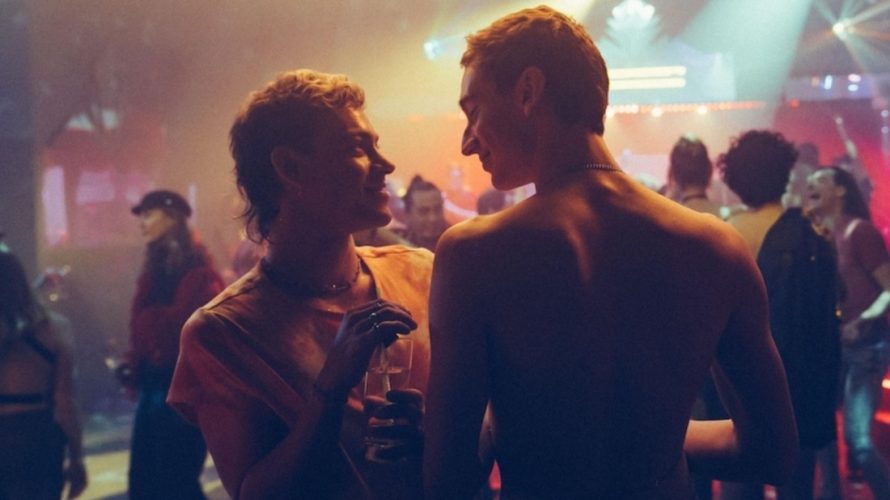

Featured Review
Solo ★★★
Released: 19 September 2025
Director: Sophie Dupois
Starring: Theodore Pellerin, Felix Maritaud
Set in the lively Montreal drag scene, Solo has a colourful surface that hides a dark underbelly. Director Sophie Dupuis and lead performer Theodore Pellerin’s third collaboration navigates abusive relationships and self-love in this engaging albeit messy feature.
Simon (Theodore Pellerin) is an up-and-coming drag queen, smashing every performance he puts on as Glory Gore. He has a supportive community of fellow drag queens and a close relationship with his sister Maude (Alice Moreault), who revels in creating outfits for Glory Gore. Simon’s life takes a turn when his absent opera star mother Claire (Anne-Marie Cadiuex) and new seductive drag performer Oliver (Felix Maritaud) both arrive in town. He loves his mother more than she does him—Claire leaves her son after barely five minutes of reuniting—and a steamy relationship with Oliver quickly turns sour.
Similar to her previous work, Dupuis’ film leans into naturalistic shooting and directing. This direction makes tense scenes even more uncomfortable; we, the audience, feel Oliver’s venomous words as he berates Simon, as well as Simon’s despair every time Claire lets him down. But this isn’t a straight-faced social realist drama. Solo has fun with form and structure too. The editing is great—a smash cut from argument to passionate sex is at once hilarious and tragic—but it’s the drag sequences that stand out.

Evoking MTV music videos from the 1980s, the glitzy performances are full of sparkles, neon colours, and striking lens flares. It certainly helps to convince us that these drag queens are the real deal when the choreography and outfits are stunning. Off the stage, that naturalistic direction effectively comes in to portray these performers as a tight-knit group of not just colleagues but found family members.
Solo’s beating heart is Pellerin, who delivers a heart-wrenching performance. A rising star to keep an eye on, he effortlessly evokes so many conflicted feelings with the subtlest of glances and expressions. Simon admires his mother but attempts to convince himself that she loves him back, even when he clearly acknowledges Claire has no love, or even respect, for her own son. When Oliver dominates the relationship and verbally beats him down, Simon withdraws into himself. Thanks to Pellerin and Maritaud’s performances, Solo does an excellent job of showcasing how abusive partners can seep into every aspect of one’s life.
But what prevents Solo from being a stellar piece of queer cinema is Dupuis’ script. This is a busy film with several narrative and thematic strands: an abusive relationship, a distant mother, and the pursuit of greatness in art. There are several moments where they neatly come together—particularly how Simon’s need for self-love comes to fruition when Oliver and Claire interact—but ultimately they feel disconnected. Most frustrating is Solo’s ending. Simon’s internal resolution is rushed, and the film seems to suggest that in order to solve serious issues, all you need to do is be ‘strong’ and lip-sync.
Whilst Dupuis’ third feature doesn’t reach its full potential, Solo is still worth watching. Pellerin is a star in the making, and Dupuis certainly has a strong visual eye. With a stronger script, Dupuis and co could seriously shake up the filmmaking scene.
-

 Features4 weeks ago
Features4 weeks agoThe World’s End? How The Long Walk/The Mist Mirror Today’s Society
-

 Movie Reviews4 weeks ago
Movie Reviews4 weeks agoLondon Film Festival 2025 – Wake Up Dead Man: A Knives Out Mystery ★★★★
-

 Movie Reviews3 weeks ago
Movie Reviews3 weeks agoI Swear ★★★★★
-

 Featured Review3 weeks ago
Featured Review3 weeks agoLondon Film Festival 2025 – Hedda ★★★★
-

 Movie Reviews3 weeks ago
Movie Reviews3 weeks agoTron Ares ★★
-

 Featured Review3 weeks ago
Featured Review3 weeks agoLondon Film Festival 2025 – High Wire ★★★★
-

 Interviews2 weeks ago
Interviews2 weeks agoDon Worley on Second Chances, Making Movies and Stand-Up Stages
-

 Features4 weeks ago
Features4 weeks agoThe Gentlemen Season Two Reportedly in the Works













